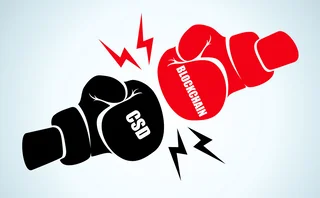
STP break puts banks at risk
Third-party banks using the continuous-linked settlement (CLS) service may be subject to increasing operational risk as a result of a breakdown in straight-through processing (STP), reports Risk's sister publication FX Week .
"It's a break in STP and what did we introduce STP for? To reduce risk," said Prinz. "These banks are replacing settlement risk with operational risk."
While many of the 63 third-party banks now using CLS report that this break in STP does not worry them at the moment, Prinz believes that is because they are still in start-up mode and as volumes remain low, manual intervention is not too problematic. However, as volumes grow on CLS, and as the need for an audit trail of transactions becomes clear, these banks will feel very differently about straight-through processed confirmations, he believes. "In start-up mode it's not a problem, as volumes are low – it's not a big issue to monitor manually with five transactions a day." But with the kind of volumes that banks are projecting they will put through CLS, "you couldn't handle it manually".
CLS Bank, which launched on September 9, 2002, and operates the CLS service for forex, now regularly settles above $1 trillion a day, and hit a record of $1.45 trillion following the July 4 holiday in the US.
Only users who have a paid subscription or are part of a corporate subscription are able to print or copy content.
To access these options, along with all other subscription benefits, please contact info@risk.net or view our subscription options here: http://subscriptions.risk.net/subscribe
You are currently unable to print this content. Please contact info@risk.net to find out more.
You are currently unable to copy this content. Please contact info@risk.net to find out more.
Copyright Infopro Digital Limited. All rights reserved.
As outlined in our terms and conditions, https://www.infopro-digital.com/terms-and-conditions/subscriptions/ (point 2.4), printing is limited to a single copy.
If you would like to purchase additional rights please email info@risk.net
Copyright Infopro Digital Limited. All rights reserved.
You may share this content using our article tools. As outlined in our terms and conditions, https://www.infopro-digital.com/terms-and-conditions/subscriptions/ (clause 2.4), an Authorised User may only make one copy of the materials for their own personal use. You must also comply with the restrictions in clause 2.5.
If you would like to purchase additional rights please email info@risk.net
More on Settlement risk
Margin settlement risk and its effect on CVA
Sponsored feature: CompatibL
CLS to replace core settlement system
Overhaul will leverage conventional technology rather than blockchain solution that underpins new CLSNet service
Netting no problem for blockchain, tech firms tell regulators
Firms say DLT can sit with current market practice, but instantaneous settlement 'not desirable'
Distributed ledger innovators imagine a world without CSDs
CSDs counter they fulfil functions blockchain cannot, and regulatory changes are needed to disintermediate them
Banks eye Traiana for EM forex netting service
Industry turns to utility as CLS emerging markets push stalls
Euroclear and Clearstream granted time to agree joint road map
Icma ERC continues to push for plans to improve Bridge settlement times
CLS facing obstacles adding RMB to its platform
RMB volumes set for growth but settlement remains an issue
FX clearing a priority for 2014, vows CLS chief
Working with banks and CCPs to facilitate central clearing of OTC forex options is 'high priority strategic initiative' for CLS this year, says chief executive David Puth







